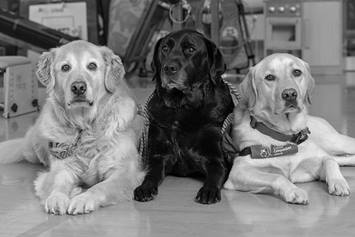Butterfly Paws
Healing Through Canines
Facility and Therapy Dogs at Nationwide Children's
The Butterfly Paws program is dedicated to bringing comfort, joy and therapeutic support interventions to patients, families and staff. This is achieved through the power of specially-trained facility and therapy dogs. Our mission is to unleash the incredible bond between humans and dogs to facilitate healing, enhance emotional well-being and contribute to the achievement of Best Outcomes.
Butterfly Paws Purpose
Butterfly Paws exists to serve as a transformative force within our health care system, offering healing touch and supportive interactions for those who need it most. We believe Butterfly Paws dogs and their handlers have the ability to create moments of respite, emotional support, connection, motivation and engagement that ultimately contribute to the overall well-being of the community as a whole.
Butterfly Paws Program Growth
The Butterfly Paws program is in the beginning stages of building a kennel of canines to support our patients, families and staff. Currently, you will see us in public spaces. As we work to increase our dogs and volunteer presence, you will start to see us visiting inpatient units. We look forward to supporting daily visits in the future but until then our “Pups are in Progress.”
Stay tuned and visit our site often to learn how you can support Butterfly Paws, including potential volunteer opportunities. Please note, for the safety of our patients, pups and the Butterfly Paws team, canines are not allowed to enter rooms in which a patient is immunocompromised, on isolation precautions or in procedural areas.
Butterfly Paws Goals
Enhanced health and recovery: The Butterfly Paws program aims to expedite the recovery process by providing innovative interventions through the use of facility dogs. This ultimately results in improved physical and emotional outcomes for our patients.
Support emotional well-being: The Butterfly Paws program is committed to strengthening the emotional well-being of our patients, families and staff by utilizing therapy dogs to provide comfort, companionship and relief during challenging times.
Empower health care teams: The Butterfly Paws program seeks to empower our health care professionals by equipping them with tools and resources to integrate facility and therapy dogs seamlessly into treatment plans, patient and family interactions and staff supports, which ultimately increases engagement and connections.
Foster a positive hospital environment: The Butterfly Paws program seeks to create a warm, welcoming and nurturing hospital environment, where the healing power of the human-canine bond is celebrated and accessible to all who desire this canine support.
Community engagement: The Butterfly Paws program engages and collaborates with our community partner, Canine Companions, to provide professionally trained dogs that align with our high-level standards at Nationwide Children's Hospital.
Public connections: The Butterfly Paws program embraces our local community and encourages volunteers and staff to apply to participate in providing canine support within our therapy dog program. Our kennel of canines consists of facility dogs and therapy dogs, with both types of dogs having different jobs and roles.
What Is a Facility Dog, and What Are Handlers?
Facility dogs are professionally trained to work in a specific clinical setting alongside their designated handler. Together they work within their professional scopes of practice to provide targeted and goal-directed interventions directly with patients. These canines are utilized when traditional therapeutic treatment modalities are not working and offer patients a source of motivation, comfort and encouragement when navigating complex medical and behavioral health journeys.
A handler is a trained clinical team member who is certified to utilize the facility dog as a treatment modality in their area of clinical practice. Handlers complete a rigorous interview process, extensive training, and yearly competencies to maintain their skills and certifications.
What Is a Therapy Dog?
Therapy dogs are pets of our staff or volunteers who have achieved therapy dog registration. They have permission to enter Nationwide Children's to provide comfort or support to patients, families and staff. They help to create a calm, positive and joyful atmosphere within the health care environment.
Therapy dog/owner teams at Nationwide Children's have passed evaluations and are registered as a team by Nationwide Children's-approved therapy dog organizations. Therapy dog/owner teams can be employee owners or volunteer owners.
What Else Should I Know About the Difference Between Facility and Therapy Dogs?
Facility dogs are service animals that have been trained from birth until 2 years before they are placed with their handler to do a specific job. Just like our professional staff, these dogs are trained to work in designated clinical areas. The professional staff member, known as the dog’s handler, is trained to learn the 50+ commands and maintains control of the animal at all times. These working dogs are dedicated to helping individuals with targeted and goal directed tasks and interventions. Nationwide Children's currently has two facility dogs – Hud and Boltz. Facility dogs are always on a command, and you should always ask the handler if it is OK to interact with a facility dog before approaching the animal. Likewise, therapy dogs also follow instructions provided by volunteer or staff handlers, but their primary role is it to interact and socialize.
If you see a dog with a gray badge and Canine Companions logo on their vest, these are working dogs and should not be approached.
If you see a dog with a blue badge and blue vest that says therapy dogs, please ask their handler if you can interact. These pups are eager for your attention.

Donate to Butterfly Paws
Today, we have the chance to build something and lay the foundation for a program that will help some of our most vulnerable patients. We can make a difference, with your help.
